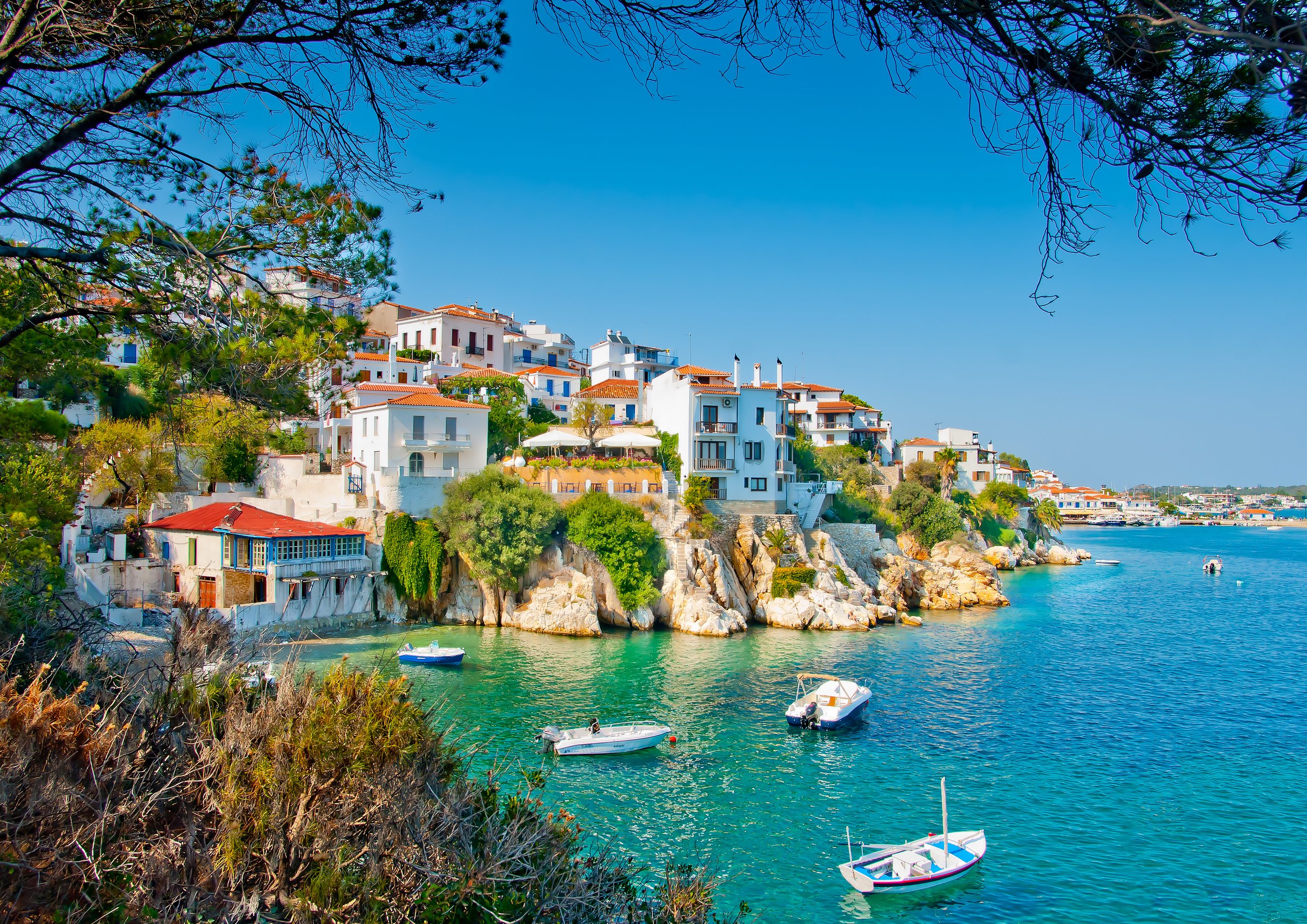The cost of buying a home in Greece doesn’t stop at the purchase price. You should expect to pay around 10% in additional fees – but knowing where that money goes can help you budget smartly. Here’s what to expect and how to stay in control.
Greece is one of the more affordable European countries for overseas buyers, but alongside your property’s price tag, you’ll need to factor in taxes, legal fees and estate agent fees and currency costs.
Whether you’re paying in cash or with a mortgage, and whether you’re buying new-build or resale, will all impact your final total.
This guide breaks down the key fees, including those that can be negotiated and those that can’t.
Download the Greece Buying Guide
Contents
Overview of buying costs
As a rule of thumb, you should budget around 10% of your property’s purchase price to cover all the additional costs involved in buying in Greece. These include transfer tax or VAT, legal fees, notary costs, land registry, agent commission and – if applicable – currency exchange and mortgage expenses. Most of these costs are calculated based on the property’s taxable value, not its market price, which may be lower.
| Cost type | Typical rate | Applies to |
|---|---|---|
| Transfer tax | 3.09% | Resale homes or plots |
| VAT | 24% | New-builds without VAT exemption |
| Notary fees | Around 2% + VAT | All property types |
| Land registry | Around 0.5% | All property types |
| Estate agent | 2-4% + VAT (shared) | Typically split between buyer and seller |
| Lawyer | Around 2% + VAT | Legal due diligence and buyer support |
Key taxes and legal fees
Transfer tax
If you’re buying a resale home or land plot, the Greek government charges 3.09% of either the commercial value or the tax-assessed value (whichever is higher). In rural areas, the tax value is usually below market price. This is one of the largest non-negotiable costs.
VAT on new-builds
New properties may come with a 24% VAT charge – but currently, there’s a government VAT exemption scheme in place until the end of 2025. If the developer applies for this exemption, you’ll instead pay the lower 3.09% transfer tax, which can significantly reduce upfront costs.
Notary fees
Your notary handles the legal transfer of ownership and prepares the deed. Fees are fixed by law and usually amount to about 2% of the higher of the sale price or the tax value, plus VAT.
Land registry
Registering your new ownership at the local registry costs around 0.5% of the taxable property value. The notary submits this on your behalf, and the fee may vary slightly between municipalities.

Expert support costs
Estate agents
Greek estate agents charge a commission of 2-4% plus VAT, which is split between buyer and seller. The fee is based on the agreed final price. If the same agent is acting for both parties, the fee may be negotiable.
Lawyers
A property lawyer is your safety net. They will check for debts, ensure clean title, advise on zoning restrictions and act as your representative. A lawyer’s 2% fee is small compared to the value they add – especially if you’re buying remotely.
Speak to a Greece property expert
Currency exchange and risk
If you’re paying in pounds for a property priced in euros, don’t overlook the cost of transferring your money abroad. Banks typically offer poor exchange rates and high fees.
Why use a specialist provider?
Specialist currency providers like Smart Currency Exchange offer:
- Better rates – typically within 2% of the interbank rate
- No commission or transfer fees
- Forward contracts to lock in a rate
Example: how forward contracts save money
You agree to buy a home in Crete for €250,000 in June, with completion expected in October. If the exchange rate falls from 1.17 to 1.12 in that time, your purchase suddenly costs around £8,700 more. A forward contract locks in your June rate – eliminating that risk.
Mortgage-related costs
If you’re financing your purchase with a mortgage, particularly from a Greek bank, there are several additional costs to plan for.
Loan application fees
Greek banks may charge a processing fee of €500-€1,500 depending on the loan value and bank.
Valuation fees
The bank will require an independent valuation of the property before approving the loan. Expect to pay €300-€500 for this.
Life or property insurance
Some lenders require borrowers to take out insurance policies as a loan condition. Costs vary depending on age and property type, but plan for €200-€600 annually.
Utility connection fees
Setting up utilities like electricity, water, broadband and gas is one of the final steps in the buying journey.
If utilities are already connected:
- You’ll pay small administrative fees (typically €50-€150 per service) to transfer contracts.
If not connected:
- Installation fees for electricity and water can range from €200 to €1,000, depending on location and provider.
Internet packages are available from around €25/month, but rural connections may require a satellite provider or local workaround.
Remote setup tips
If you’re buying from abroad, your lawyer or estate agent can usually assist in setting up utilities. Be sure to grant them legal authority (via a power of attorney) during the purchase process.
Post-purchase costs
Once you’ve bought your home, there are a few ongoing ownership costs to plan for:
Unified Tax on the Ownership of Real Estate (ENFIA)
This is calculated based on the taxable value and location of the property. For a typical two-bedroom apartment or villa, this could range from €200 to €1,000 per year.
Ongoing maintenance
Costs depend on whether the property is part of a managed development or a standalone home. Expect to pay:
- €300-€800/year in communal fees
- €500-€2,000/year for general upkeep
Insurance
Buildings insurance is recommended. Budget €200-€500 per year depending on property value and region.
Tips for managing and reducing costs
Negotiate the asking price
It’s common to offer under asking price in Greece, especially if a property has been on the market for a while. The lower the final price, the lower your percentage-based fees.
Understand assessed values
In highly desirable areas, the gap between market value and taxable value widens – which means you could pay higher percentage-based taxes on a smaller “official” value. It’s worth checking this early on.
Choose your location carefully
Prices and assessed values vary widely across Greece. For instance, a one-bedroom flat in Athens may carry higher ongoing taxes than a detached house in rural Peloponnese.
Consider renovation projects
Buying the “worst house on the best street” can bring tax savings upfront, but be realistic about renovation costs and timeframes. Always get a builder’s quote before signing.
Use professional advice strategically
A good lawyer will often help you renegotiate small details that can reduce tax, speed up completion or uncover issues early. Again – it’s worth the fee.
Frequently asked questions
Yes, UK citizens can legally buy property in Greece. Since Brexit, you may face additional residency requirements if you want to stay for longer than 90 days in any 180-day period, but the right to purchase property has not changed.
Some of the most affordable islands include Evia, Thassos and Lefkada, where you can still find traditional village homes under €100,000. In contrast, hotspots like Mykonos and Santorini are among the most expensive.
No, you can pay for the property using a foreign bank account. However, a Greek bank account will make your purchase easier, and it’s useful for paying ongoing costs like utility bills, property taxes and maintenance fees. If you decide not to open a local account, you’ll still need to apply for a Greek tax number (AFM), as this is a legal requirement for all property purchases.
You might also like:









